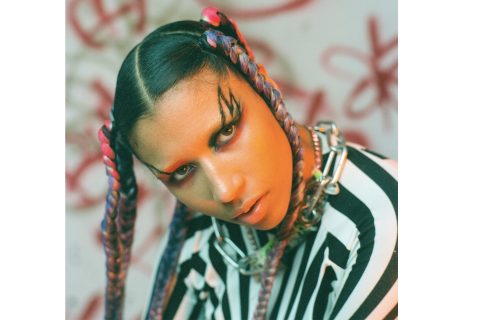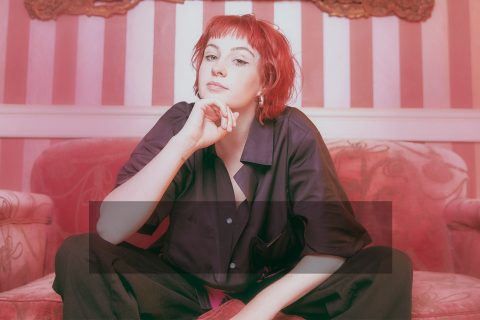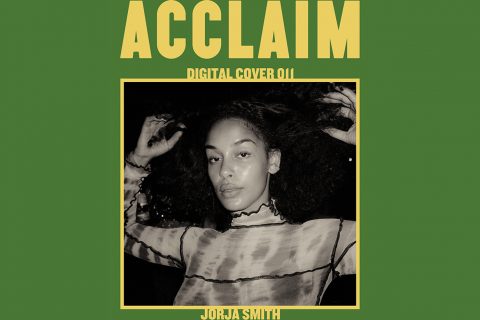
Arlo Parks has exploded, mushrooming across the music world like an atomic bomb. If you’re an avid music reader you’ll already know this, having seen her appear on platforms such as Clash and Tiny Desk, to performances on COLORS, to articles in the New York Times. At the surprisingly young age of 20, this is no easy feat. Yet with the creative abundance that steams from Arlo Park’s skin, it’s obviously possible.
Beginning her career in 2018 with the release of her single ‘Cola’, Park’s honest and heartfelt lyricism surrounding the contemporary anxieties of everyday kids whet the palettes of superstars Lily Allen, Billie Eilish and Phoebe Bridgers. Since then she has gone on to release her first EP Super Sad Generation, and most recently her debut album Collapsed in Sunbeams. Far from a wishy-washy account of teenage emotionality, the release delivers a complex and nostalgic exploration of someone who is hyper-introspective and deeply observational. And while being clever in its ability to create an illusion of placing the listener as a bystander, the album allows fans to access intimate moments from other people’s lives like a fly on the wall.
What’s most impressive amidst the glory of these latest releases, is how the young artist has kept her feet firmly on the ground. She embodies a humbleness that seeps through in her eloquent and collected nature, one that underpins the pacifism of her music. Experiencing this first hand over Zoom, we had the opportunity to speak to the young artist about the universal nature of her songwriting, creating inspiration and her impressive, rich archive of influences.
Hey Arlo, congratulations on everything surrounding the release of your album!
Thank you! It’s been this kind of strange, surreal experience of having all of these massive moments, but then just being kind of indoors and playing scrabble with my dad and having my life feel completely normal.
Yeah, I heard that you moved back in with your parents over lockdown. How was that?
I mean, it was interesting. I think because everybody in my house has their own thing that they were up to. I was basically just in my attic bedroom making tunes and reading. It was quite nice to be surrounded by the people who kind of understand and love me best in what was quite a chaotic time in my career.
So I wanted to start by talking about your songwriting because I know that it’s a massive part of your musical process. It starts off as a stream of consciousness, turns into poetry and then you mould that into lyrics. Is there a certain process you abide by to be struck by inspiration? Or does inspiration come pretty sporadically for you?
Yeah, I mean I think what’s been interesting is that over lockdown when I was writing the album I had to kind of commit to more actively inspiring myself, so I was watching a lot of films directed by Wong Kar-Wai and Fellini and Xavier Dolan, and I was reading books. I was going through old journals, I was having to kind of find that thing that struck me because before it would be a conversation or when I wrote ‘Caroline’, it was about a fight I saw across the street, but in lockdown, because things were so stagnant, I had to properly search for new materials to absorb.
How do you decide on the material you consume? Or is it random?
I mean I guess it’s usually recommendations from people I trust but usually it’s just random. I love just going on Poetry Foundation or looking up ‘best french new-wave films’ because I don’t really know that much about film for example. I think that what inspires me most is any art that feels vulnerable, that doesn’t necessarily have to operate in a certain type of genre. Just anything that feels kind of human because people inspire me the most when I’m writing.
So I’ve read that when you write you take these hyper-specific moments and make them universally relatable. Where does this want or ability come from, do you think?
I guess when I think about the artists that I look up to, they’ve always had that similar thread, for example, people like Phoebe Bridgers or Elliott Smith. I’ve always gravitated towards that really specific imagery. I think it also comes from the poetry that I love and again songwriting for me is all about taste. I just love listening to songs that I can get immersed in because it feels like they’re talking about me but not. And when I listen to Stranger in the Alps, for example, by Phoebe Bridgers, or Sufjan Stevens album Carrie & Lowell, it kind of feels that way. It feels like they’re talking about something really intimate to them but also to you.
A lot of the influences that you have – Sufjan Steven, Phoebe Bridgers, Radiohead, Frank Ocean – they’re these artists that invoke a sense of nostalgia, and that’s a prominent theme on this record. What is it about evoking those feelings of nostalgia that attract you? I mean I think for me, especially for my first record, I wanted it to be about the things that shaped me, and I think looking at the past is always interesting, having that balance between not inhabiting the past but acknowledging it and learning from it, and what things you do remember, and what things you don’t. Like how do you see the things that have happened to you now? I was just really interested in the idea of what has shaped me and how I got here, and I think nostalgia was an interesting lens to look through that with. Even when I think about the art that I was consuming, I was revisiting a lot of the albums and films that I watched as a kid and just thinking about how they affect me now. It was really interesting to me.
What were a few of those films that you watched as a kid?
I got really into the Studio Ghibli vibes. So I was watching Princess Kaguya, I was watching Porco Rosso, I was also watching Spirited Away. I was watching Wes Anderson movies as well, Fantastic Mr Fox, Moonrise Kingdom, all that kind of stuff. It’s interesting to revisit those as an adult actually, cause there are a lot of lessons in there that you still can bear in mind. Whether it’s a relationship to nature, or being patient, or family relationships. I think that’s really interesting.
In your songs you constantly refer to peoples names – Mary, Charlie, Alice, Caroline, Eugene – where do those names come from? Who do they belong to?
So some of those names are names of people who either were in my life or are in my life now, like Sophie or Alice. They all represent real people but sometimes I just kind of select another name, just for aesthetic reasons. I’m not really sure why but I think the reason why I love using names in songs is that it feels like you’re overhearing a letter being written to someone, it almost feels invasive, almost in a way that you’re not quite meant to be there but you’re overhearing a personal conversation.
You touch on multiple genres throughout this album, going from hip hop to Motown to disco, and each genre being predominant on one song. How did you go about constructing the genre in this album? Was it purposeful, one genre for each song?
No, not really, I think I approached it song by song, and day by day, and I would just wake up in a different mood. The day before we made ‘For Violet’ and ‘Caroline’ I was listening to a lot of In Rainbows (Radiohead), I was listening to Mezzanine (Massive Attack), I was listening to Blue lines (Massive Attack), and I think that the reason why it sounds so broad is because I was literally trusting my instincts on that day, and seeing what came out.
I noticed that you didn’t have any collaborations on this record. Was that a purposeful choice too?
I mean I thought about having collaborations but I think I wanted it to feel like it was my statement of intent almost. Like collaboration is something that I love but I think because it was my first record I just wanted to give people an idea of who I was and what I wanted to do and then branch out into collaboration later, so it was kind of half-conscious I guess.
And is there anyone you have your eye on for collaboration in the future?
Yeah I mean Frank Ocean would be the dream, I’d love to do something with Janelle Monet as well, I think she’s awesome. I think it would be cool to do something with someone a bit outside of my genre, like Grimes or something crazy like that.
Wow, yeah Grimes would be insane.
Yeah, imagine how crazy that would be. Damn, she’s awesome.
So I’ve been looking around, reading a couple of interviews and I actually haven’t seen many that touch on how you got into music and what you were like as a kid. So I guess how did you get into music and what were you like as a kid?
(laughs) Yeah, do you mean in terms of making music, or just listening?
Let’s do both.
Okay, so when I was a bit younger, I always had music playing around the house but it was probably when I was like 13 or 14 that I really kind of found artists that felt like mine, you know what I mean, I found people like King Krule, I found the Arctic Monkeys first record, I found Pulp, I found My Chemical Romance. I found all these artists that I felt connected to in some way. That kind of coincided with the time I picked up the guitar, and because I was listening to a lot of singer-songwriters like Leonard Cohen, and Keaton Henson, and Soko, I started writing songs on guitar. Then I heard hip hop and switched it up, so I started trying to make beats on my laptop on Garageband, and doing spoken word over the top of it, and just experimenting. That’s how I got to be here, honestly, just by trying things, and I think that I always had this connection to music and to lyricism. I remember reading Just Kids (Patti Smith) for the first time, and I remember that being a big moment for me in terms of realising that you could meld poetry and instrumentation and that they could be layered.
It amazes me how many things you reference just because I feel like I do not have the capacity to remember so many references and inspirations. So that’s really impressive to me.
(laughs) Oh thank you, I think it’s because I’ve been collecting vinyl since I was quite young, so I have that visual reference of what the face on the front of the record is, what the sleeve looks like, and that’s all kind of stored up in my brain.
It seems like you’re a very visual thinker.
Yeah definitely, definitely.
How would you say that visual thinking plays into how you write music?
It sounds very simple but I just picture things a lot. I’ll just picture a scene, like I’ll just close my eyes and it’ll be like a polaroid or a snapshot and I’ll almost be describing it, imagining how it would look if you read the lyrics off a page and being like okay, does that capture the scene completely, like what are the details that are missing from what I can see in my memory.
It sounds like you should be a filmmaker as well.
(laughs) Maybe, maybe, that’s something I’ve always kind of wanted to dabble in.
So this generation coming up seems pretty politically radicalised, especially teens coming-of-age. I was wondering if that inspires your music, the ultra-verbalised thoughts around sexuality, race, mental health?
I mean I guess, I’ve always been a person who writes about what I saw and I guess my identity does colour that lens, but for me it comes from more of a place of private desire to heal rather than saying things for the sake of saying things. Its less of a kind of oversharing and more I’m talking about my life.
So one more question: What can we expect from you in the future?
More collaborations, I’m working on a poetry collection, I want to delve into acting and filmmaking and just, yeah my main goal is to expand into different branches of the arts and carry on making music that feels true and pure in intentions.
Follow Arlo Parks here for more and stream ‘Collapsed in Sunbeams’ below.



